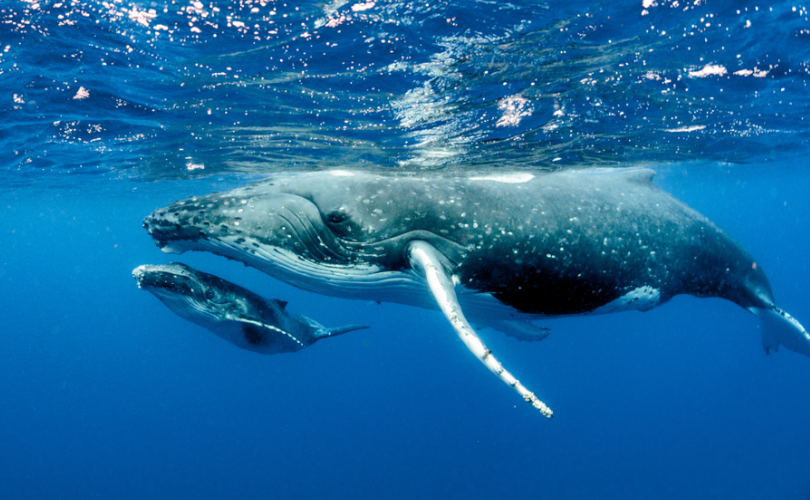(LifeSiteNews) — “Gay, lesbian and intersex whales: our queer sea has much to teach us.” That’s not The Babylon Bee, or The Onion back when it was funny. That’s a genuine headline from The Guardian on March 1, where once again we are being told that because animals do all sorts of things, the 2024 iteration of the LGBT movement is clearly right about everything.
Headline-hunting activist academics have been doing this sort of thing for quite a while now. You may remember the “news” that “lesbian penguins” were raising a “genderless chick” at the London Aquarium; the “same-sex parenting” of all sorts of species was bandied about during the marriage debate as evidence that Christians, who recognize humans as unique among animals by virtue of our rational faculty, were clearly not “following the science.” Following the science, you see, means celebrating lesbian penguins and genderfluid seafowl.
READ: The transgender movement has rendered our national institutions incompetent and untrustworthy
Now, Philip Hoare excitedly informs us that: “The first documented sex between two male humpback whales is just the latest challenge to our presumptions about sexuality.” (I myself didn’t have a huge number of presumptions about the sex lives of humpback whales, but alright.) This is leaving aside the fact that whale-to-human comparisons, which are always exceedingly tricky, are particularly so with this example. Hoare admits:
In fact, one of the whales was ailing and there has been speculation that the encounter may not have been consensual or that the healthy whale was actually giving comfort to the other. Whatever the truth, such ‘flagrant’ acts also expose many of our human presumptions about sexuality, gender and identity.
Keen readers will note that the phrase “whatever the truth” is doing some heavy lifting there; Hoare wishes to dispense with the complexities of marine copulation and move onto his preferred subject, which is the lessons we as human beings can learn from them. Unsurprisingly, the lesson we can learn is a simple one: Philip Hoare and the LGBT movement are correct about human sexuality, and those of us who do not wish to adopt our sexual ethics from the “queer sea” or a healthy male whale taking advantage of a sick one are very, very wrong.
Perhaps it is because I grew up in the country surrounded by animals that I am unimpressed with the idea that animal mating has anything to do with human sexual morality. Anyone who has kept chickens – or ducks, for that matter – would surely agree. In fact, I would be quite worried if someone told me that they’d been taught much about human sexuality by watching their animals. I suspect many of those who endorse LGBT biology would be, as well. Not Hoare, though. While waxing eloquent about the various ways that sea creatures engage sexually, he writes:
Male-oriented science has in the past made various judgments regarding sexual behaviour. But the idea of lesbian whales should not be surprising. Ryan even cites the case of a ‘non-binary’ beaked whale, which was discovered to have both male and female genitalia. Even identifying as a species can be fluid for cetaceans. In 2022, near Caithness in Scotland, a bottlenose dolphin was found to be identifying as a porpoise, swimming with a pod of porpoises and using their vocalisations. In one of the great queer pairings of the 20th century, Virginia Woolf referred to her lover, Vita Sackville-West, as ‘my porpoise.’
Hoare spends several more paragraphs attempting to make the clumsy case that the “queer sea” should cause us to embrace gender fluidity, or something – he doesn’t mention that they have not yet discovered sea animals volunteering for castration due to identity crises, but I look forward to the inevitable and valiant effort. He does admit that “We cannot know how whales and dolphins themselves regard genital interactions,” which is a big admission, all things considered.
He also notes, in the concluding paragraph, that “So much of what we project on to whales and dolphins is about our own complexes.” Which is true. I don’t see academics making the case for basing our ethics on any other forms of animal behaviour, and for extraordinarily obvious reasons. In the specific instances of gender and sexuality, however, Hoare posits that the “queer sea has much to teach us.” In a saner time, this would be met by gales of laughter. In our time, it gets a column in The Guardian.





